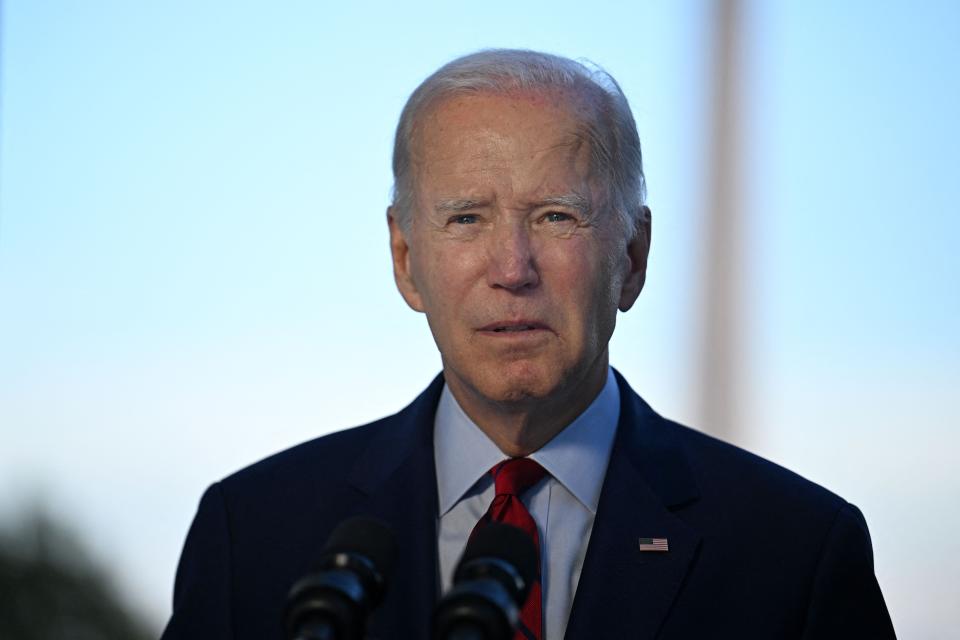Donald Trump would 'probably not' pass this Florida civic literacy exam, academics say

Florida high schoolers attending a public college are required to meet civic literacy requirements.
Academics in the Sunshine State are unsure if Donald Trump could pass the exam.
Several jurisdictions are questioning Trump's understanding of, and adherence to, US laws and norms.
Answer the following question:
Which phrase best describes the power of impeachment?
A. the ability of the US House to charge federal officers with a crime or violation
B. the ability of the US Supreme Court to determine constitutionality of laws
C. the power of the US Senate to remove federal officers for a crime or violation
D. the power of the US President to enforce decisions of federal courts
The answer to the question is A.
But former President Donald Trump might offer an alternative answer — "witch hunt," his favored description of the process he twice endured and twice survived.
Trump is widely expected to run for a nonconsecutive second term in 2024 even while facing several local, state, and federal investigations, including for his role in the January 6, 2021 Capitol attack. As he ponders a presidential comeback, here's another question:
Could Trump, Florida's most famous resident, pass a civics exam championed by Gov. Ron DeSantis — a potential political rival — and administered to Sunshine State high school students?
Insider asked four college professors whether they think Trump could pass the test. Most were doubtful and one suggested a similar version of the test should be given to people running for office to assist voters in picking the best candidates.
Iqbal Akhtbar, an associate professor in the Department of Politics and International Relations at Florida International University was among those who were uncertain of Trump's ability to pass the test.
"I don't know if he [Trump] would pass the exam," Akhtbar said. "It does seem that he's not clear on many very basic points of American history in our democracy."
Akhtbar thinks President Joe Biden would pass the exam, saying that "he's served in the Senate for many years, and he has a good sense of how the federal government works."
Sean Freeder, an assistant professor of political science at the University of North Florida said of Trump passing the test: "Perhaps he could, perhaps he couldn't."
"He's the only post-World War II president I can think of that I would not confidently tell you that I think he could pass it," Freeder said.
Peter Bergerson, who's taught political science courses and is a professor at Florida Gulf Coast University for more than 30 years, was reluctant to pass judgment on Trump's test-taking skills.
"I'm just not in a position to know whether he would or not," he said. "I mean my instinct and my gut feeling is probably not."
Trump's team did not respond to Insider's request for comment.

'Real history and civic responsibility'
Since 2019, many future college students in Florida are required to take the Florida Civic Literacy Examination — a test modeled after the US Citizenship and Immigration Services Naturalization Test to encourage civic literacy in the Sunshine State.
DeSantis commissioned the testing requirement in 2019. Along with other civic education initiatives in Florida, the test is a response to what DeSantis calls an attempt by the Biden administration to "devolve history into squishy theory," so students can learn "real history and civic responsibility."
"The sad reality is that only two in five Americans can correctly name the three branches of government, and more than a third of Americans cannot name any of the rights guaranteed by the First Amendment," DeSantis said in a 2021 press release.
According to the Florida Board of Governors, high school graduates planning to attend a public college/university must demonstrate: an understanding of the Constitution, the basic principles of American democracy and how they are applied in republican forms of government, landmark Supreme Court cases and their impact, and the founding documents like the Declaration of Independence and the Bill of Rights, and how these shaped the country's self-governance.

Trump vs. the civics test
A sample version of the Florida civics test includes numerous questions about topics Trump has proven to misunderstand in his public statements.
An Insider review of Trump's public statements indicates he might struggle with some of them.
Take Watergate, for example.
Question: Which of the following reflects the most important consequence of the Watergate break-in?
A. legalization of capital punishment
B. creation of levees around coastal cities
C. resignation of the president of the United States
D. integration of surveillance technology in society
The answer is C.
Question: Use the passage below, from an exchange between former president Nixon and a television interviewer, to answer the question that follows. "Well, when the president does it, that means that it is not illegal" — Richard M. Nixon. Which constitutional principle does the statement from President Nixon contradict?
A. separation of powers
B. Republicanism
C. rule of law
D. equality
The answer, again, is C.
Political observers frequently compared the events of Trump's presidency to Watergate, a scandal that led to Nixon's resignation.
Trump also frequently name-checked Watergate, accusing Democrats of various misdeeds — usually against Trump himself — he says eclipse Watergate in their severity.
For example, Trump said that a scandal involving former Secretary of State Hillary Clinton's private email server was "worse than Watergate." He later revised his statement and said it was "magnitudes worse than Watergate."
Trump also offered a rosy assessment of Nixon's presidency, telling the New York Times in 2016: "I think what Nixon understood is that when the world is falling apart, people want a strong leader whose highest priority is protecting America first … The '60s were bad, really bad. And it's really bad now. Americans feel like it's chaos again."
Trump's comments have previously shown a lack of proper understanding about how the US government works. He made that clear when he declared the 2020 election a fraud, demanding Vice President Mike Pence to invoke the 25th amendment.
The ex-president's counsel told him that wasn't how the amendment worked, as revealed by the January 6 committee.
Separately, the Cato Institute published a litany of "constitutional misdeeds" in which author Ilya Shapiro said Trump and his administration engaged, including Trump stating that Article II of the Constitution gives him the "right to do whatever I want as president."
In this regard, one Constitution-focused query stands to stump Trump.
Question: What is the principal function of a written Constitution?
A. resolving disagreements between competing parties
B. confirming resistance to civil disobedience
C. declaring the independence of a state
D. outlining the structure and powers of a government
The answer is D.
Trump has even been publicly challenged over whether he has read the Constitution, such as when Khzir Khan, a Muslim-American lawyer and father of a US solider killed in Iraq, waved a pocket Constitution in the air while speaking at the 2016 Democratic National Convention.
"Have you even read the United States Constitution?" Khan asked of Trump. "I will gladly lend you my copy. In this document, look for the words 'liberty' and 'equal protection of the law.'"
Trump retorted in a statement: "Mr. Khan, who has never met me, has no right to stand in front of millions of people and claim I have never read the Constitution, which is false."
One question Trump might answer with greater ease involves the media and defamation laws.
Question: Laws against defamation, including libel and slander, property damage and breach of contract represent which legal concern underlying most Western nations?
A. criminal law
B. military law
C. civil law
D. juvenile law
The answer is C.
Trump has frequently touted the concept of defamation because he has both sued people for defamation — and been sued for it.
Trump recently filed a 282-page report threatening to sue CNN because they said his voter fraud claims were "baseless." As recently as Friday, Trump sent a fundraising email via his Save America political action committee stating: "I have notified CNN of my intent to file a lawsuit over their repeated defamatory statements against me. I will also be commencing actions against other media outlets that have defamed me and defrauded the public."
Trump also lost a bid to counter-sue E. Jean Carroll, a New York advice columnist, who sued him for defamation in 2019 after he denied raping her over two decades ago.

The difference between practicing and knowing literacy
These civic literacy benchmarks required by the state can be reached by receiving a 60% on the Florida Civic Literacy Examination, passing an Advanced Placement or International Baccalaureate test or completing certain civics classes.
To pass the Florida Civic Literacy Examination specifically, students must answer 48 out of 80 questions correctly — 60% or higher.
Lonna Atkeson, director of the Leroy Collins Institute, a public think tank based out of Florida State University in Tallahassee, says many people "don't understand" how certain aspects of the government work.
"We hope that our elected leaders have some understanding of government, but sometimes that's certainly not the case," Atkeson said.
However, Atkeson said she thinks Trump could get a passing grade, especially after already serving a term as president.
"I think he could pass the test. I mean, he's lived here a long time. He understands things," Atkeson said.
She did not say the same for Biden.
"Cognitively, you know, maybe he [Biden] might have some cognitive difficulties right now, so I'm not sure. Maybe at one point ... I don't know about right now, wouldn't that be an interesting test?" Atkeson said.
Politicians, of course, only need to pass one kind of test — an election — to win a seat in Congress, or even the White House.
Bergerson said he wouldn't give a student a test "designed to stump them," and therefore, he wouldn't do that to a president either.
Based on Biden's congressional background, Bergerson said he thought Biden could pass.
Freeder suggested a test for politicians could help voters with choosing who they elect to lead them.
"I think that when the American people vote, that should be one additional piece of information that they should have sitting there whether or not it seems like these people know their stuff about basic aspects of American politics," Freeder said. "I'd love to see a better version of this exam more extensively applied to people running for office."
For Trump, Bergerson added there "is a difference between knowing the literacy and practicing the literacy.
"I wonder whether President Trump, if he knows there's a big difference between knowing them being exposed to them, a man once in office in a position to understand that people are sovereign; the constitution is the governing body," Bergerson said.
Read the original article on Business Insider


